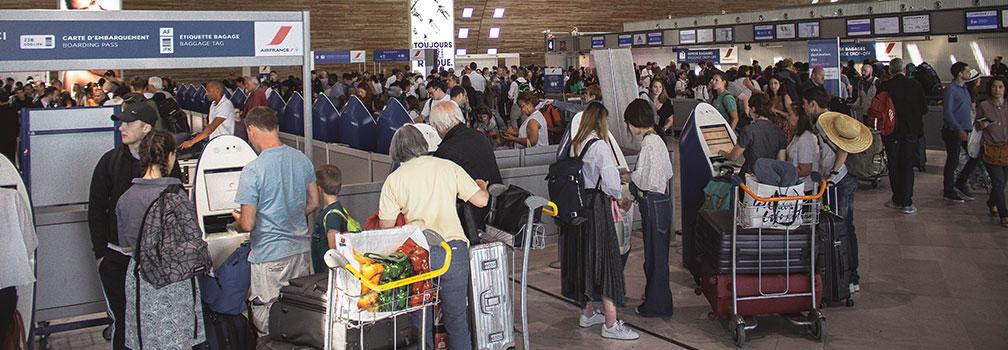
Traveling by plane is a necessity. People dependent on medications for maintaining their quality of life often have to deal with airport security. Oftentimes, the experience can be confusing. Many people who rely on medication are not aware of the policies when bringing in medication through airport security. This article hopes to ease that burden.
Airport security ensures that passengers abide by a multitude of rules and guidelines. The rules are strict especially when it comes to prescription medications. Sometimes, the process can feel like threading a needle.
Organize All Your Medication in a Carry-On Bag
For your convenience, we recommend including a medication bag or pouch in your carry-on. Use this to store all your medication. This is important for easy access should you need to take your medication while on the plane. Also, it is easier to get through airport security if you have all your medication organized in a carry-on bag for quick inspection.
What Are the Rules for Taking Prescription Drugs Through US Airport Security
Always Bring Your Doctor’s Prescription
Carry your doctor’s prescription with you when traveling with medication, especially when crossing international borders. Presenting a copy of your prescription is recommended when bringing in medication through airport security.
Pack Medication in Your Carry-On
Store your prescription medicines in your carry-on bag. In the event of unexpected delays or lost baggage, having your essential medications in your carry-on ensures you can access them when needed even while flying. Your carry-on is your lifeline during your journey, so keep your medication bag within reach. Also, inspection is so much easier when you have your medication in your carry-on.
Here are also some practical tips for storing your medication safely during your travels:
Maintain Proper Temperature
Most medications need to be kept at room temperature and not be exposed to extreme heat. The airplane cabin is an ideal place for keeping medication since the temperature is controlled.
Original Containers with Labels
Always keep your medications in their original containers with their original labels. This will ease the screening process since the original containers have labels that contain vital information about the medication.
Bring Extra Doses
Security checks often allow travelers to carry extra doses of their medication. The Food and Drug Administration (FDA) recommends bringing no more than 90 days worth of medication.
Understanding TSA Special Procedures with Medications and Medical Conditions
Traveling with medications and managing medical conditions can be challenging, especially when navigating airport security. The Transportation Security Administration (TSA) provides specific guidelines to ensure a smooth process for travelers. Here’s what you need to know:
Screening Process and Declaration of Medications
All travelers, including those with medical conditions, must undergo security screening. This may include a pat-down or technology-based screening. The TSA PreCheck® program offers expedited screening for eligible travelers.
All pills and other solid medications must be screened and have clear labeling. Liquid medications, gels, and aerosols for medical purposes are exempt from the 3-1-1 liquids rule but must be declared at checkpoints.
Always inform TSA officers about any medically necessary liquids or medications, and separate them from other belongings.
3-1-1 Liquids Rule Exemption
Medically necessary liquids, gels, and aerosols for your trip are allowed in reasonable quantities. They will be screened separately and are not required to be in a zip-top bag.
Handling Sensitive Screening
If you prefer not to have your liquid medication screened by X-ray or open screening, you can always inform the TSA officer. An additional screening procedure will be applied, including a pat-down.
What Type of Medications Can I Bring?

When it comes to bringing medications during air travel, it’s essential to be aware of the types of medications you can bring and the regulations surrounding their transportation.
According to the TSA, you may bring medically necessary liquids, medications, and creams over 3.4 ounces or 100 milliliters in your carry-on bag. All medication should be declared.
Here’s a general guide you can follow when bringing your medications.
Prescription Medications
You are allowed to bring prescription medications on board. Ensure they are in their original packaging with the prescription label clearly visible. It’s advisable to carry a copy of the prescription or a letter from your healthcare provider, especially when traveling internationally. Therefore, if you’re traveling internationally, research the specific medication regulations of the countries you’ll be visiting. Some countries may have restrictions or require additional documentation.
In some cases, your medication might be illegal in your destination and you must talk with your health care provider to give you an alternative medication.
Over-the-Counter (OTC) Medications

Most over-the-counter medications, such as pain relievers, allergy medications, and cold remedies, are allowed. Keep them in their original packaging to facilitate the screening process.
While it’s not a strict requirement, it’s wise to keep your prescription drugs in their original containers. Original medicine bottles contain essential information about the contents, which can be helpful if questioned by security personnel, especially for opioid pain management or narcotic drugs. This can expedite the security screening process and provide clarity if any questions arise.
Liquid Medications
When carrying liquid medication, it’s advisable to store it in a TSA-approved bag for liquid medication. These specialized bags are designed to prevent spillage and meet airport security regulations. They help keep your medicines secure, even during turbulence.
Liquid medication exceeding 3.4 ounces is permissible in carry-on bags, provided it is in reasonable quantities for the duration of the flight. It is essential to inform the security officer about the presence of medically required liquids at the beginning of the screening checkpoint process. These liquids may undergo additional screening, potentially involving requests to open the container.
Gel-based Medications
Gels, such as topical medications or oral gels, are typically allowed. Like liquid medications, follow the 3-1-1 rule for gels.
Injectable Medications
If you require injectable medications, such as insulin or EpiPens, you can bring them on board. Carry a copy of the prescription and inform security personnel in advance. Be prepared for additional screening if necessary.
Pills and Solid Medications
Pills and solid medications, including tablets and capsules, are allowed. Keep them in their original packaging or a pill organizer for easy identification during screening.
Medical Equipment
Certain medical equipment, such as CPAP machines, nebulizers, and mobility aids, are permitted. Notify the airline in advance if you have medical equipment to ensure a smooth boarding process.
Herbal Supplements
Herbal supplements and vitamins are generally allowed. However, it’s advisable to carry them in their original containers to avoid any issues during screening.
Getting Through Airport Security with Your Medication
Airport security checkpoints are important for ensuring the safety of air travel. Present your essential medical items, such as prescription drugs, separately to the screening officer. The screening officer may request that you open your bottles or containers containing medically necessary liquids for inspection and testing. This testing might involve transferring liquids into alternative containers or examining small quantities of the liquids. If your medically necessary liquids cannot be opened or X-rayed, you can still carry them with you, but you may be subjected to a pat-down screening, so it is recommended that you get this done as early as possible so you don’t miss your flight.
Additionally, unless you have a medical condition or disability preventing you, wear a prosthetic device, or are over 75 years old, you must still remove your shoes during the screening process. If you choose not to remove your shoes, be prepared for them to be inspected and tested for explosives while you are wearing them.
Dealing with Lost or Damaged Medications
We never expect it to happen but sometimes, medications do get lost or damaged when traveling. Dealing with lost or damaged medications during travel can be stressful. Here are some important steps that you can take to manage this situation.
Immediate Actions
Before anything else, it is very important for you to assess the urgency of the damaged or lost medication. Health-critical medications require swift action. For non-urgent medications, you may have more time to replace them.
For urgent medications during international travel, you can ask the assistance of your country’s embassy or consulate. They will provide you with guidance on local medical services and emergency support.
Healthcare Providers
Reach out to your healthcare provider back home. They can send an electronic prescription or contact a local pharmacy that can fill out your prescription.
Emergency Prescriptions and Travel Insurance
If you are unable to reach your healthcare provider back home, you can visit a local doctor for an emergency prescription. Having travel insurance in these cases can help. Many insurance policies cover the costs of replacing lost or stolen medications.
Traveling with Prescription Medication Shouldn’t Be Difficult
Bringing medication when traveling by air requires careful adherence to rules and regulations to ensure a hassle-free journey. After reading this article, you should be able to navigate airport security with confidence. Plan ahead to make your travel experience a hassle-free experience.
